

Mrs Dalloway. Plot summary[edit] Clarissa Dalloway goes around London in the morning, getting ready to host a party that evening.
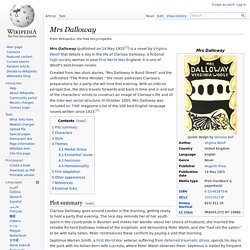
The nice day reminds her of her youth spent in the countryside in Bourton and makes her wonder about her choice of husband; she married the reliable Richard Dalloway instead of the enigmatic and demanding Peter Walsh, and she "had not the option" to be with Sally Seton. Peter reintroduces these conflicts by paying a visit that morning. Septimus Warren Smith, a First World War veteran suffering from deferred traumatic stress, spends his day in the park with his Italian-born wife Lucrezia, where Peter Walsh observes them. Septimus is visited by frequent and indecipherable hallucinations, mostly concerning his dear friend Evans who died in the war.
"Master Harold"...and the Boys. The play was initially banned from production in South Africa.[1] Plot[edit] Seventeen year-old Hally spends time with two middle-aged African servants, Sam and Willie, whom he has known all his life.
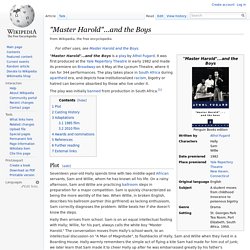
On a rainy afternoon, Sam and Willie are practicing ballroom steps in preparation for a major competition. In the Lake of the Woods. Plot summary[edit] The main storyline often branches out to flashbacks of significant events in John Wade's past.
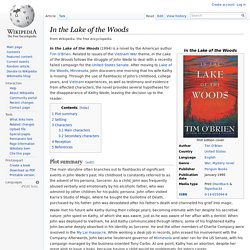
His childhood is constantly referred to as the advent of his persona, Sorcerer. As a child, John was frequently abused verbally and emotionally by his alcoholic father, who was admired by other children for his public persona. Gulliver's Travels. Travels into Several Remote Nations of the World.
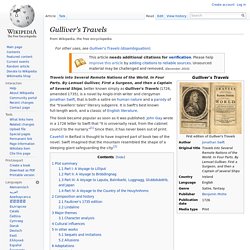
In Four Parts. By Lemuel Gulliver, First a Surgeon, and then a Captain of Several Ships, better known simply as Gulliver's Travels (1726, amended 1735), is a novel by Anglo-Irish writer and clergyman Jonathan Swift, that is both a satire on human nature and a parody of the "travellers' tales" literary subgenre. It is Swift's best known full-length work, and a classic of English literature. The book became popular as soon as it was published. Go Tell It on the Mountain (novel) Go Tell It on the Mountain is a 1953 semi-autobiographical novel by James Baldwin.
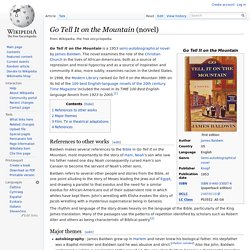
The novel examines the role of the Christian Church in the lives of African-Americans, both as a source of repression and moral hypocrisy and as a source of inspiration and community. It also, more subtly, examines racism in the United States. In 1998, the Modern Library ranked Go Tell It on the Mountain 39th on its list of the 100 best English-language novels of the 20th century. Time Magazine included the novel in its TIME 100 Best English-language Novels from 1923 to 2005.[1] Going After Cacciato. Plot Introduction[edit] The main idea of the story is, by O'Brien's estimation, that being a soldier in Vietnam for the standard tour of duty entails constant walking; if one were to put all the walking in a straight line, one would end up in Paris, where Cacciato is going.
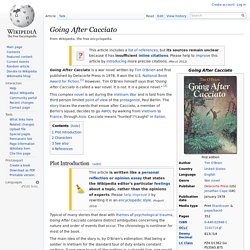
Cacciato is always portrayed as self-sufficient and happy. The Glass Menagerie. The Glass Menagerie[1] is a four-character memory play by Tennessee Williams which premiered in 1944 and catapulted Williams from obscurity to fame.
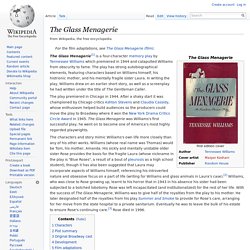
The play has strong autobiographical elements, featuring characters based on Williams himself, his histrionic mother, and his mentally fragile sister Laura. In writing the play, Williams drew on an earlier short story, as well as a screenplay he had written under the title of The Gentleman Caller. The play premiered in Chicago in 1944. After a shaky start it was championed by Chicago critics Ashton Stevens and Claudia Cassidy, whose enthusiasm helped build audiences so the producers could move the play to Broadway where it won the New York Drama Critics Circle Award in 1945. The Glass Menagerie was Williams's first successful play; he went on to become one of America's most highly regarded playwrights.
A Gesture Life. A Gesture Life is a novel written by Chang-Rae Lee, a South Korean author who has been living in the United States since 1965, which takes the form of a narrative of an elderly physician named Doc Hata, who deals with everyday life in a small town in the United States called Bedley Run, and who remembers treating Korean comfort women for the Japanese Imperial Army during World War II.
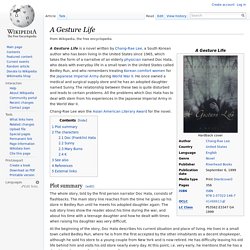
He once owned a medical and surgical supply store and he has an adopted daughter named Sunny. The relationship between these two is quite disturbed and leads to certain problems. The Fixer (novel) The Fixer is a novel by Bernard Malamud published in 1966 by Farrar, Straus & Giroux.
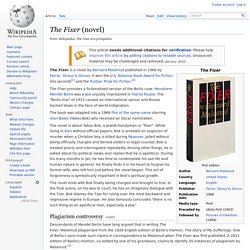
It won the U.S. National Book Award for Fiction (his second)[1] and the Pulitzer Prize for Fiction.[2] The Fixer provides a fictionalized version of the Beilis case. Menahem Mendel Beilis was a Jew unjustly imprisoned in Tsarist Russia. Fifth Business. Fifth Business is a 1970 novel by Canadian playwright, critic, journalist, and professor Robertson Davies.
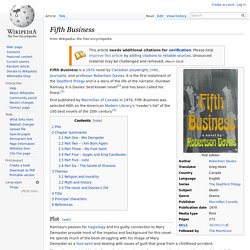
It is the first instalment of the Deptford Trilogy and is a story of the life of the narrator, Dunstan Ramsay. It is Davies' best-known novel[1] and has been called his finest.[2] Ethan Frome. Plot[edit] Ethan Frome is set in a fictional New England town named Starkfield, where an unnamed narrator tells the story of his encounter with Ethan Frome, a man with dreams and desires that end in an ironic turn of events. The narrator tells the story based on an account from observations at Frome's house when he had to stay there during a winter storm.[2] The narrator fails to get many details from the townspeople. Equus (play) Equus is a play by Peter Shaffer written in 1973, telling the story of a psychiatrist who attempts to treat a young man who has a pathological religious fascination with horses.[1] Shaffer was inspired to write Equus when he heard of a crime involving a 17-year-old who blinded six horses in a small town near Suffolk.[2] He set out to construct a fictional account of what might have caused the incident, without knowing any of the details of the crime.
The play's action is something of a detective story, involving the attempts of the child psychiatrist, Dr. Martin Dysart, to understand the cause of the boy's actions while wrestling with his own sense of purpose.[3] The stage show ran in London between 1973 and 1975: later came the Broadway productions that starred Anthony Hopkins as Dysart (later played by Richard Burton, Leonard Nimoy, and Anthony Perkins), and from the London production, Peter Firth as Alan. Tom Hulce replaced Firth during the Broadway run. The Diviners by Margaret Laurence. Death of a Salesman. Plot[edit] Willy Loman returns home exhausted after a cancelled business trip. Worried over Willy's state of mind and recent car accident, his wife Linda suggests that he ask his boss Howard Wagner to allow him to work in his home city so he will not have to travel.
Willy complains to Linda that their son, Biff, has yet to make good on his life. Despite Biff's promise as an athlete in high school, he flunked senior-year math and never went to college. Biff and his brother Happy, who are temporarily staying with Willy and Linda after Biff's unexpected return from the West, reminisce about their childhood together. The next day, Willy goes to ask his boss, Howard, for a job in town while Biff goes to make a business proposition, but neither is successful.
Biff leaves the restaurant in frustration, followed by Happy and two girls that Happy has picked up. Characters[edit] William "Willy" Loman: The salesman. Theme[edit] The Death of Ivan Ilyich. This article is about the novella. For the Austrian development critic, see Ivan Illich. The Dead (short story) "The Dead" is the final short story in the 1914 collection Dubliners by James Joyce. It is the longest story in the collection. At 15,672 words it has also been considered a novella. Gabriel Conroy - The main character of the story.Kate Morkan and Julia Morkan - Gabriel and Mary Jane's aunts, elderly sisters who throw a party every year during Christmas time.Mary Jane Morkan - Niece of Kate and Julia Morkan.Lily - Maid.Gretta Conroy - Gabriel's wife.Molly Ivors - Colleague of Gabriel, very patriotic about Ireland.Mr.
Browne - Only Protestant guest at the party.Freddy Malins - An alcoholic and friend of Gabriel.Bartell D'Arcy - A famous, retired tenor. JOYCE HOUSE, the fictional Morkan sisters' home. 15 Usher's Island, Dublin. Upon arriving at the party with his wife, Gabriel makes a joke that is not funny about the maid's marriage prospects; and he fidgets, adjusts his clothing, and offers her money as a holiday present.
Bowen, Zach (1974). Dancing at Lughnasa. The Country of the Pointed Firs. Copenhagen (play) It opened on Broadway at the Royale Theatre on 11 April 2000 and ran for 326 performances. Directed by Michael Blakemore, it starred Philip Bosco (Niels Bohr), Michael Cumpsty (Werner Heisenberg), and Blair Brown (Margrethe Bohr). The Catcher in the Rye. Plot summary[edit] Holden begins his story at Pencey Prep, an exclusive private school (fictional, though based on Salinger's own experience at Valley Forge Military Academy) in Agerstown, Pennsylvania, on the Saturday afternoon of the traditional football game with rival school Saxon Hall.
Billy Budd. Billy Budd, Sailor is a novella by American writer Herman Melville, first published posthumously in London in 1924. Melville began writing the work in November 1888, but left it unfinished at his death in 1891. The Autobiography of an Ex-Colored Man. History[edit] Johnson originally published The Autobiography of an Ex-Colored Man anonymously in 1912 by the small New York publisher Sherman, French, and Company. He decided to publish it anonymously because he was uncertain how the potentially controversial book would affect his diplomatic career. He wrote openly about issues of race and discrimination that were not common then in literature.[1] The book's initial public reception was poor.[2] It was republished in 1927 by Alfred A. Knopf, an influential firm that published many Harlem Renaissance writers, and Johnson was credited as the author. Atonement (novel) Atonement is a British family saga novel written by author Ian McEwan and published in 2001.
It is about understanding and responding to the need for atonement.